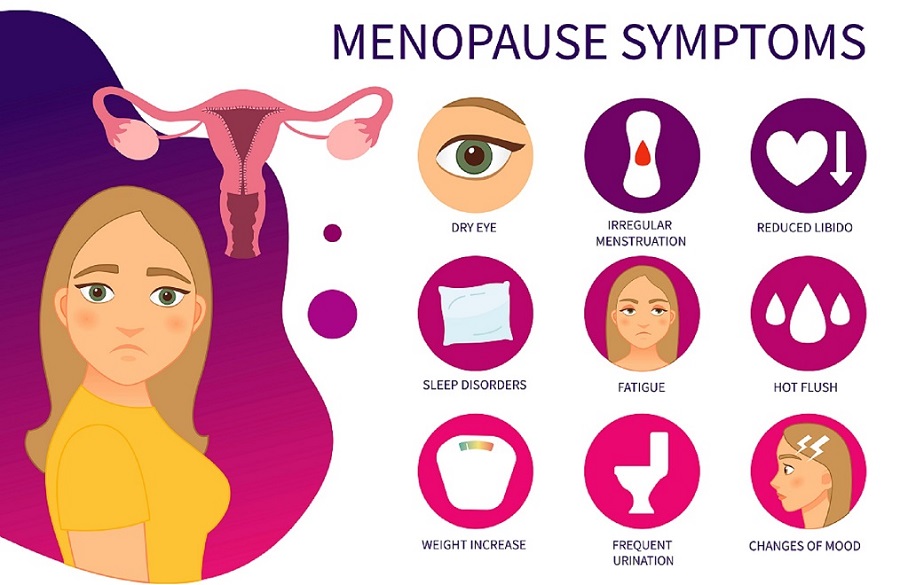Menopause is the period of life when you stop having monthly menstruation. This marks the natural end of the reproductive phase of your life, when there are no more eggs left to release into your ovaries. Most Australian women reach menopause between 45 and 55 years of age. The average age at menopause is around 51. Once you’ve gone through 12 consecutive months without a menstrual period, you are in menopause. Some women experience early menopause due to health problems such as primary ovarian failure (where the ovaries no longer function normally). Menopause can also occur after an oophorectomy, a surgery to remove the uterus or after cancer treatment.
Treatment options for menopausal symptoms include hormone replacement therapy (HRT), complementary therapies and lifestyle changes. The most commonly used conventional treatment for menopausal symptoms is hormone replacement therapy, also known as menopausal hormone therapy (MHT). It consists of s estrogen alone (in women after a hysterectomy) or in combination with a progestin. Many women choose not to start or use HRT due to potential health risks and side effects. They decide to explore safe alternative therapies such as acupuncture and traditional Chinese medicine to relieve menopause symptoms.
What symptoms are associated with menopause?
Women experience their menopause quite differently. Many women experience only mild discomfort, while others experience more severe symptoms. The symptoms of menopause are usually temporary and typically subside after a few months, but sometimes they may last for several years. The average duration of vasomotor symptoms during menopause is about 4 years, but in about 10% of women these symptoms last longer than 12 years.
Altered hormone levels during perimenopause and menopause, particularly declining estrogen levels, can cause acute menopausal symptoms. The most obvious symptom of menopause is hot flashes, which affect approximately 75% of postmenopausal women. Other symptoms of menopause syndrome include night sweats, emotional sensitivity, sleep problems, fatigue, cognitive changes, joint pain, vaginal dryness, and loss of sexual desire. Some women also report psychological symptoms such as fatigue, difficulty sleeping, mood swings, forgetfulness and loss of libido.
Specifically, the symptoms of menopause that women experience may include:
-
- Changes in the menstrual cycle – Your menstrual cycle may change as you approach menopause, with periods becoming less frequent or more frequent, referred to as perimenopause.
- Hot flashes or night sweats – You may suddenly feel warm in your neck and chest, accompanied by changes in heart rate and a sense of fatigue.
- Sleep disturbances (insomnia) and/or reduced energy levels. You have trouble going to sleep, or you feel as if you lack energy throughout your day.
- Muscle or joint pain.
- Vaginal and urinary symptoms – as the vaginal lining becomes thinner and drier, you may experience discomfort during sex and the urge to urinate more frequently.
- Mood changes: You may feel anxious, nervous, sad or angry in more situations.
Severe menopausal symptoms can have a significant impact on a woman’s quality of life, relationships, work productivity, and utilization of health services.
How do you know when you’ve reached menopause?
Believe it or not, menopause cannot be detected with a specific test. Your doctor will help you determine whether you are going through menopause based on the frequency of your periods and the symptoms you are experiencing. Menopause is confirmed 12 months after the last menstruation. Blood tests can’t accurately predict menopause. If you are concerned about irregular periods, heavy or unusual bleeding, or symptoms that make daily life difficult, see your GP to get medical advice.
How do you deal with the symptoms of menopause?
Treatment for menopausal symptoms depends on the individual woman, her stage of life, her relationships, and her overall health and well-being. A healthy lifestyle, natural and complementary therapies, menopausal hormone therapy or HRT (formerly called hormone replacement therapy or HRT), and some prescription medications can help relieve menopausal symptoms.
Most women can cope with mild menopausal symptoms without taking any medication or using therapies. If you think you need treatment for your menopausal symptoms, ask your GP for advice about the best treatment for your individual situation.
Recommendations for menopausal treatment
One of the most effective ways treating menopausal symptoms is Hormone replacement therapy (HRT), also known as menopausal hormone therapy (MHT). Historically, it has been used as a standard and effective treatment for hot flashes, sweating, mood swings, irritability, insomnia, joint pain, and vaginal dryness. Although the most recent and comprehensive studies on MHT show that many healthy women can safely use it to relieve menopausal symptoms for years, many women still worry about the side effects and health risks associated with MHT. Therefore, it is important to consult your doctor first to find out if MHT is right for you.
Your doctor may also recommend certain non-hormonal medications to relieve menopausal symptoms. These include some antidepressants and other medications that may also cause side effects and health risks.
Alternative treatments
Many women try to treat menopausal symptoms such as hot flashes and night sweats with non-hormonal treatments. These options include:
-
- acupuncture and traditional Chinese medicine
- herbal remedies such as black cohosh and red clover as well as plant estrogens (phytoestrogens), which are found, for example, in soy
- hypnotherapy
- treatment of cognitive behavior
- mindfulness therapy
For vaginal dryness, non-drug treatments include the use of lubricants, oils, vaginal moisturizers, or black cohosh.
It is important to consult a doctor before attempting any treatment, including acupuncture and herbal therapies.
How Acupuncture and Chinese Medicine can help with managing menopause symptoms
Acupuncture is a gentle, natural, essential and effective method for treating menopausal symptoms. Acupuncture offsets menopausal symptoms by balancing hormones, reducing hot flashes, insomnia and irritability, and improving sleep quality. This will improve your quality of life and encourage you to be positive about the changes that are taking place in your life..
Acupuncture is a time-tested system of traditional medicine that has been used to restore, promote and maintain good health in China and other Eastern cultures for thousands of years. Its benefits are now recognized around the world and over the last decade acupuncture and Chinese medicine have begun to play an increasingly important role in mainstream healthcare in Australia.In addition to the needle, your doctor may use techniques such as moxibustion, cupping, massage, or electroacupuncture. Changes in dietary and lifestyle may be recommended as well.
Acupuncture takes a holistic approach to health and treats illness as a sign of imbalance in the body. The exact form and degree of imbalance varies from person to person. The acupuncturist’s skill is to determine the exact nature of the underlying discord and select the most effective treatment. The selection of acupuncture points is individually tailored to the needs of each patient. Acupuncture and traditional Chinese medicine (TCM) can also be used preventatively to strengthen the body and promote overall well-being.
In TCM, menopause is considered a normal part of life and Yin deficiency is deemed to be the cause. Throughout our lives Yin is expended by work, stress, grief, giving birth, taking care of others illness and just general day to day living. This means that with Yin deficiency your body is not as efficient at balancing your natural rhythms of cooling, calming, moistening, leading to symptoms we describe as hot flushes, irritation, anxiety, not sleeping and generally feeling out of balance and not quite ourselves.
Systematic reviews and randomized controlled trials published after their completion have found:
-
- no difference between real and sham acupuncture in the treatment of menopausal symptoms,
- acupuncture is at least as effective and sometimes even better than hormone therapy,
- additional acupuncture improves usual or self care, and
- moxibustion is better than no intervention.
These results suggest that sham acupuncture itself has a therapeutic effect, thus reducing its usefulness as a “placebo” control for “real” acupuncture. However, both reviews conclude that further high-quality research is needed to confirm this.
Acupuncture can help relieve menopause and perimenopause symptoms by:
-
- regulate serum estradiol levels, follicle-stimulating hormone and luteotrophic hormone;
- increases relaxation and reduces tension. Acupuncture may alter the brain’s mood chemistry by decreasing serotonin levels and increasing endorphins and neuropeptide Y, which may help combat negative affective states;
- stimulation of nerves in muscles and other tissues, resulting in the release of endorphins and other neurohumoral factors and altering pain processing in the brain and spinal cord.
Growing evidence from Western researches points to the effectiveness of acupuncture in treating a variety of medical conditions. From a biomedical perspective, it is believed that acupuncture may stimulate the nervous system and influences the production of the body’s own communication substances: hormones and neurotransmitters. The resulting biochemical changes activate the body’s homeostatic self-regulatory systems, stimulating its natural healing abilities and promoting physical and emotional well-being. Further research is needed in evaluating the efficacy of acupuncture and Chinese herbal medicine for the management of menopause.
How can we help with managing your menopause symptoms?
At Baolin Acupuncture and Chinese Medicine Centre, we strive to provide excellent healthcare with care and compassion. Our experienced TCM practitioners will review your medical and emotional history and create a treatment protocol. We take into account that your symptoms may change with each visit. We will help you create a self-care plan that fits your lifestyle and work with you to take conscious steps to overcome and self-manage menopausal symptoms.
We use acupuncture and Chinese herbal medicine to help with menopause symptoms. Acupuncture treatment is customised for each patient by developing unique acupuncture points. Individual herbal formulas comprised of various herbs are given to fit each individual’s health condition and address their underlying issue. Additionally, you will get advice for your dietary and life style changes to help ease the symptoms of menopause. For more information on acupuncture and Chinese herbal medicine for managing menopause symptoms, please contact us at our clinics (Perth: 9228 8828; Subiaco: 9380 4171). You can also send us your enquiries through our online contact page.


